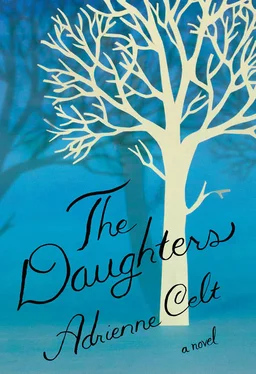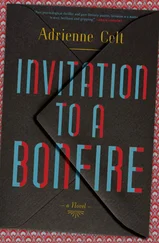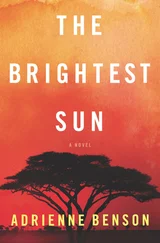Sopranos are not, as such, required to be beautiful. But I’ve never found that it hurts to keep my limbs slender and strong, darken my eyes with liner and just a smudge of shadow. Swimming is part of my life’s rhythm. A legacy from Ada. But it’s also — how did the doctor phrase it? — taxing , and so for today, this is the best I can do in terms of water. A warm shower in the morning. A hot bath at night.
Kara’s mouth is open as I step under the stream, and she widens it slightly, closing her eyes and screwing up her face. Her forehead wrinkles with a special intensity as she’s drenched, and I turn so that my own back occupies the majority of the flow.
“Shh,” I say, jogging her gently up and down. This is good practice. After all, in another week she will be baptized, a priest cupping cold water over her skullcap. Perhaps if we spend enough time in the shower beforehand she won’t be daunted.
As it’s planned, I’m supposed to join the choir at the ceremony, which I gave Baba Ada free rein to arrange. When she told me this I shrugged — I’m more than proficient in “Ave Maria.” But she made her preparations, and I agreed to them, when I was only halfway through my pregnancy. When she was still alive, and I thought I would sing to Kara, lullabies and arias, from the very day of her birth. Now I think about my lungs and twist a bit, trying to feel them behind my ribs. I take half a breath and huff it out, part of a warm-up I’ve used since I was six and enjoyed pretending that I was a dragon. It doesn’t hurt much but sends my pulse racing anyway. I imagine walking up the nave of the church and splitting in half across the altar.
At this moment, my babenka ’s body is in the ground. Not festering, as we had her cremated, but still buried. I found it very hard to believe that the small box of ashes they gave us was her —even if we all lose some essence at the moment of death, it didn’t seem to weigh enough.
I was in the hospital for six days, and when I was released we went to visit her in the mortuary, where she had been arranged and clothed and powdered. Apparently they do these favors even when a body is earmarked for fire — that, and keep it in cold storage up until the very hour of its conflagration. We were nervous on the way over, as if by waiting even those few days to present the baby we’d violated the basic rules of decorum. When in fact, bringing her at all was unusual, at least according to the mortuary staff. John called ahead to let them know we were coming — polite, it seems, in all circumstances — and when we arrived we were ushered into a small room that was not unlike a suite in some anonymous hotel. There was even an electric kettle and a selection of inexpensive teas. Baba Ada had been laid out on a table, wrapped up to her chin in an acrylic comforter that matched the wallpaper. Green and gold whorls. I laid my head on her chest, and it crinkled. A plastic, stuffed animal sound.
Tissues had been provided for our convenience. The institutions of life and death are nothing if not thoughtful, prepared.
I barely remember her funeral. John says it was lovely, but then again he arranged the whole thing — amazing how quickly an event of that size can be thrown together, when needed. I do remember that it was cold. The doctor recommended that I be wheeled up in a chair, since there would be a fair amount of standing and moving about, and I was still quite freshly opened. So Kara and I sat wrapped up in our respective blankets, just two bundles taking condolences from a faceless line of mourners. You’d think some great and specific accident had taken place. Ada dead. Me, near crippled. And then this baby, hale and pink, but totally helpless. Lying in my arms as heavy as a handbag.
In the shower, Kara begins to squirm. “Shh,” I say to her again. Her many layers and rolls are slippery, and for one heart-stopping moment I feel my grip slide. Kara cries out just twice, warning shots fired across the bow, and with great difficulty I kneel down, resting her in my lap as I grope for the bath tap. From this angle I can see the majestic difference between then and now , the way my stomach slopes and bunches in new patterns, my skin the color of sickly milk. The angry scar.
When I was nineteen, in a hotel room far away, I stood in the shower with a man twice my age whose hair streaked dark beneath the water. We were in Rome, and he was a stranger, more or less. He had spotted me from the audience of a performance of Massenet’s Cendrillon while I pranced around as one of the spirits who send the opera’s lovers into an enchanted sleep. A minor part, but I caught his attention. His hands ran down my slick side, over my ribs, and into the hollow of my waist.
I can’t remember his name. Perhaps I could if I tried.
He whispered to me and I closed my eyes so that the water seemed to be rain. Soft and warm, his voice tickled the coiling hollow of my ear, brushing the small hairs deep inside, near the drum. What did he say to me? Only silly lovers’ nonsense. I’m totally disarmed, I’d give you anything. What did he do, when he wasn’t wooing young women in the dark of night? I never knew. He might have been a banker, a preschool teacher, a surgeon. I’m naked of myself , he said. You have everything. I don’t want anything for myself anymore.
Later that night I climbed out of bed onto my toes. Hair still wet and starting to curl. He slept, the stranger, his face crushed against the pillow, while I pulled on snagged silk stockings and tugged a dress down over my nose. I picked up my purse, made sure my own hotel key was inside, and left him sleeping, empty and new.
Now I clutch Kara, water rushing around my feet and down the drain, and beneath me my legs quiver with the unaccustomed strain of crouching. Resting the heel of my hand against the rim of the tub, I hoist myself into a standing position and wrap a towel around Kara, tufting it up the back of her head. I’m not sure if I’ve ever felt so keenly the various strengths and pressures of my toes against the ground, the balls of my feet against the tile. I could easily slip.
For some minutes I stand still, taking shallow breaths, afraid to move lest we both fall down.
My daughter’s face reminds me of past lovers. How do you live with that? How do you let yourself feel that complicated rush of adoration and not lose your mind? It happens every day, every time.
And of course she also calls to mind the better people I have known, the ones who wouldn’t cringe away from the task of singing to a newborn baby. The ones who were glad to sacrifice what they had so their children could live. Kara and I, we go on in spite of them. We breathe the air they gasped out with their last exhalations, swallow their dust by the happy accident of being in the world.
So , I tell myself, think of a lesson. Something Ada taught you about living. I remember being six and frankly annoyed that my babenka had signed me up for the children’s choir at a church in Pulaski Park. Up to that point I’d only sung for her or my mother at home, and I wasn’t entirely sure that music should be so widely shared. Not when it made me feel so open, so undone.
“It will be healthy for you, darling,” Baba Ada told me, “to sing in front of a crowd. You need to learn presentation.”
She was right. Sight and sound have a natural link, since sound is a primal trigger, an indication of where to look for signs of danger, water, food. We peer into trees to find hiding predators and watch dancers to see how their limbs correspond to the strain of a cello, the beat of a drum. A deaf man, if properly trained, could track the progress of a song by the flicker of a singer’s throat, the clench of muscles around lymph nodes and collarbones.
Читать дальше












